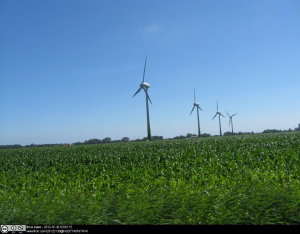October 18, 2013, by Helen Whitehead
My Sustainability Guru
 I became a convert to Sustainability because I sat next to a particular person in a meeting. This was back in 2011. Keith Pitcher, Nottingham’s first Director of Sustainability, recently arrived from the University of Leeds, presented a paper to a committee of academics on the importance of thinking about sustainability in relationship to teaching. We introduced ourselves and chatted politely until the meeting started. Keith made his pitch and the Chair asked if anyone would volunteer to discuss his ideas further with him outside of the meeting. I volunteered and a couple of weeks later Keith came to see me. I pointed to all the medieval history and archaeology books on my shelves and asked him the question; ‘What’s the relevance of sustainability to my teaching?’ We ended up having a fascinating discussion about the medieval ‘little ice age’, agricultural practices, the impact of urbanisation upon social structures, the relationship of medieval communities to their local environments – the woodlands, meadows and wastelands etc. I have subsequently had similar conversations with other academics in disciplines not obviously related to sustainability.
I became a convert to Sustainability because I sat next to a particular person in a meeting. This was back in 2011. Keith Pitcher, Nottingham’s first Director of Sustainability, recently arrived from the University of Leeds, presented a paper to a committee of academics on the importance of thinking about sustainability in relationship to teaching. We introduced ourselves and chatted politely until the meeting started. Keith made his pitch and the Chair asked if anyone would volunteer to discuss his ideas further with him outside of the meeting. I volunteered and a couple of weeks later Keith came to see me. I pointed to all the medieval history and archaeology books on my shelves and asked him the question; ‘What’s the relevance of sustainability to my teaching?’ We ended up having a fascinating discussion about the medieval ‘little ice age’, agricultural practices, the impact of urbanisation upon social structures, the relationship of medieval communities to their local environments – the woodlands, meadows and wastelands etc. I have subsequently had similar conversations with other academics in disciplines not obviously related to sustainability.
While I had always thought of myself as environmentally conscious – a user of public transport, a gardener, an advocate for recycling and ‘make do and mend’, talking to Keith helped me to connect these attitudes to my academic life as an archaeologist and historian. I’m interested in how past societies function and adapt, and how identities are constructed. This segues into our modern preoccupation with sustainability – how can we function and adapt today in positive ways that increase well-being for all and open rather than close opportunity?
In 2012, Keith and I worked together on a strategic initiative to integrate sustainability more effectively into the curriculum and student experience at Nottingham. He helped me build a team of like-minded colleagues to work on a range of initiatives – the online Sustainability course is perhaps the most significant of these. It brings together the knowledge and enthusiasm of colleagues from many different university departments – several of whom were introduced to me by Keith. Hopefully their enthusiasm will prove contagious as Keith’s did for me.
You can join the conversation by using #nooc13, #FLsustain, and #futurelearn.
Sarah Speight
Sarah is an archaeologist and educator who has been the University of Nottingham’s academic lead for sustainability since 2011. Sarah is also the lead academic for our Nottingham Open Online Course, Perspectives on Sustainability, that is available to all staff and students at Nottingham and also on our Sustainability, Society and You course that will run on FutureLearn from the 6th January 2014 and is available to anyone in the world.
Originally published on the Learning Technology Team Blog
No comments yet, fill out a comment to be the first

Leave a Reply